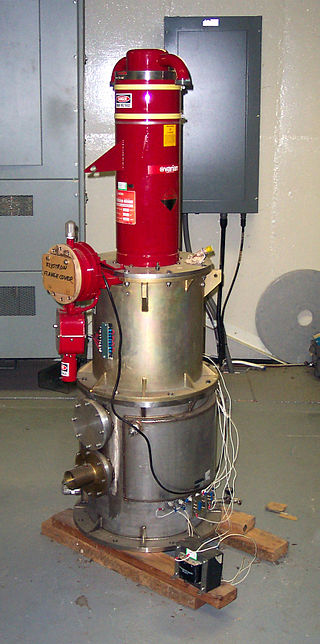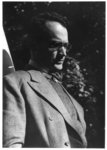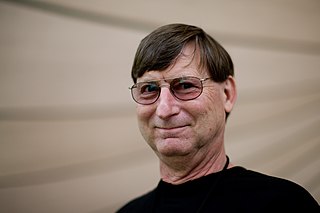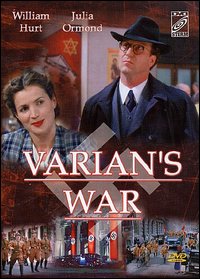
A klystron is a specialized linear-beam vacuum tube, invented in 1937 by American electrical engineers Russell and Sigurd Varian, which is used as an amplifier for high radio frequencies, from UHF up into the microwave range. Low-power klystrons are used as oscillators in terrestrial microwave relay communications links, while high-power klystrons are used as output tubes in UHF television transmitters, satellite communication, radar transmitters, and to generate the drive power for modern particle accelerators.

Varian Mackey Fry was an American journalist. Fry ran a rescue network in Vichy France that helped 2,000 to 4,000 anti-Nazi and Jewish refugees to escape Nazi Germany and the Holocaust. He was the first of five Americans to be recognized as "Righteous Among the Nations", an honorific given by the State of Israel to non-Jews who risked their lives to save Jews during the Holocaust.

Varian Medical Systems is an American radiation oncology treatments and software maker based in Palo Alto, California. Their medical devices include linear accelerators (LINACs) and software for treating cancer and other medical conditions with radiotherapy, radiosurgery, proton therapy, and brachytherapy. The company supplies software for managing cancer clinics, radiotherapy centers, and medical oncology practices. Varian Medical Systems employs more than 7,100 people at manufacturing sites in North America, Europe, and China and approximately 70 sites globally.

Hal Ronald Varian is Chief Economist at Google and holds the title of emeritus professor at the University of California, Berkeley where he was founding dean of the School of Information. Varian is an economist specializing in microeconomics and information economics.
Nancy Varian Berberick is an American fantasy author who has written 12 novels, mainly for the Dragonlance series of Dungeons & Dragons novels as well as a number of short stories.

Isaac Leggett Varian was a New York state legislator and the 63rd Mayor of New York City.

Varian, Inc. was one of the largest manufacturers of scientific instruments for the scientific industry. They had offerings over a broad range of chemical analysis equipment, with a particular focus on Information Rich Detection and Vacuum technology. Varian was spun off from Varian Associates in 1999 and was purchased by Agilent Technologies in May 2010 for $1.5 billion, or $52 per share.
Varian Associates was one of the first high-tech companies in Silicon Valley. It was founded in 1948 by Russell H. and Sigurd F. Varian, William Webster Hansen, and Edward Ginzton to sell the klystron, the first vacuum tube which could amplify electromagnetic waves at microwave frequencies, and other electromagnetic equipment. Varian Associates split into three companies in 1999: Varian Medical Systems, Varian, Inc. and Varian Semiconductor.

USS Varian (DE-798) was a Buckley-class destroyer escort of the United States Navy.

Varian is a village in Adaran Rural District, Asara District, Karaj County, Alborz Province, Iran. At the 2016 census, its population was 39, in 15 families.

Sheila Varian was an American breeder of Arabian horses who lived and worked at the Varian Arabians Ranch near Arroyo Grande, California. She grew up with a strong interest in horses, and was mentored in horsemanship by Mary "Sid" Spencer, a local rancher and Morgan horse breeder who also introduced Varian to the vaquero or "Californio" tradition of western riding. She started her horse ranch, Varian Arabians, in 1954 with the assistance of her parents. Raising and training horses was her full-time occupation beginning in 1963. She used vaquero-influenced methods of training horses, although she adapted her technique over the years to fit the character of the Arabian horse, which she viewed as a horse breed requiring a smart yet gentle approach.

Russell Harrison Varian and Sigurd Fergus Varian were American brothers who founded one of the earliest high-tech companies in Silicon Valley. Born to theosophist parents who helped lead the utopian community of Halcyon, California, they grew up in a home with multiple creative influences. The brothers showed an early interest in electricity, and after independently establishing careers in electronics and aviation they came together to invent the klystron, which became a critical component of radar, telecommunications and other microwave technologies.

The spade bit is a historic vaquero design for a type of curb bit with straight, highly decorated shanks and a mouthpiece that includes a straight bar, a narrow port with a cricket, and a "spoon," a flat, partly rounded plate affixed above the port, supported by braces on either side. Considered a highly technical piece of equipment to be used only on a finished horse, the spade bit is a refined tool that experts compare to driving a sports car in its ability to convey precise commands to the horse. Not all horses have the conformation or temperament to become a finished spade bit horse, a process that takes a number of years and is seldom complete until a horse has at least five years of training under saddle.
Ribun is a Dayak language of Borneo.

Sybra is a genus of beetles in the family Cerambycidae, containing the following species:
Roger Varian is a British Thoroughbred racehorse trainer, based at Carlburg Stables in Newmarket, Suffolk.

Sybra ordinata is a species of beetle in the family Cerambycidae. It was described by Henry Walter Bates in 1873.

Tangled is a media franchise owned by The Walt Disney Company that began with the 2010 American animated film of the same name, directed by Nathan Greno and Byron Howard from a screenplay by Dan Fogelman. Produced by Roy Conli, the film featured songs by Alan Menken and Glenn Slater, while Glen Keane, John Lasseter, and Aimee Scribner served as its executive producers. The film was loosely based on the German fairy tale "Rapunzel" from the 1812 collection Grimms' Fairy Tales by the Brothers Grimm.

Varian's War is a 2001 joint Canadian/American/United Kingdom film made-for-television drama. The film was written and directed by Lionel Chetwynd, based on the life and wartime exploits of Varian Fry who saved more than 2,000 Jewish artists from Vichy France, the conquered ally of Nazi Germany. Varian's War stars William Hurt, heading an all-star ensemble cast of Julia Ormond, Matt Craven, Maury Chaykin, Alan Arkin and Lynn Redgrave.
Ethon Sean O'Driscoll-Varian is an Irish professional footballer who plays as a striker.













